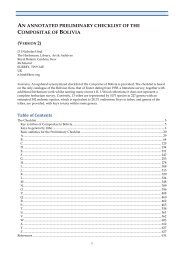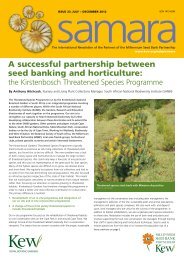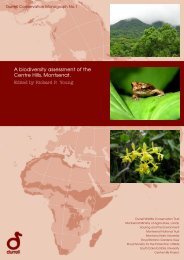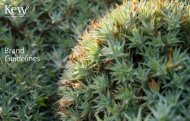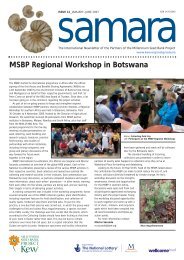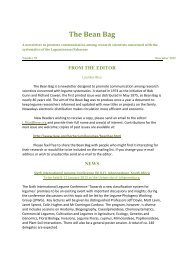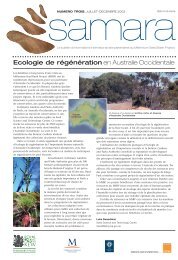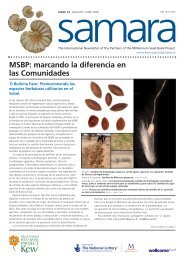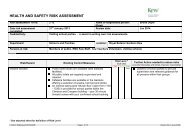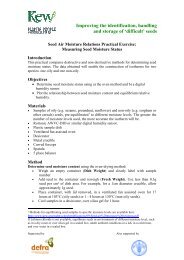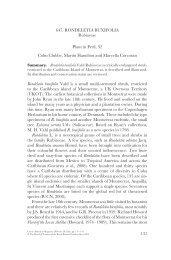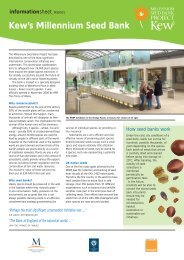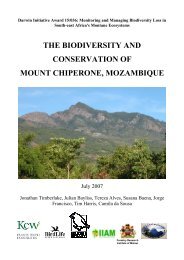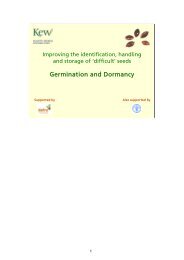Improving the identification, handling and storage of âdifficultâ seeds ...
Improving the identification, handling and storage of âdifficultâ seeds ...
Improving the identification, handling and storage of âdifficultâ seeds ...
You also want an ePaper? Increase the reach of your titles
YUMPU automatically turns print PDFs into web optimized ePapers that Google loves.
6.1. Plenary <strong>of</strong> South Africa stakeholder workshop<br />
Chairperson<br />
Dr. Robin Probert, Royal Botanic Gardens, Kew<br />
Species<br />
▪ Some lack <strong>of</strong> consensus between “difficult” species<br />
▪ Also some agreement about dormancy/<strong>storage</strong> issues – e.g. Cleome, Abelmoschus esculentus,<br />
Amaranthaceae<br />
▪ O<strong>the</strong>r difficulties due to <strong>storage</strong>/<strong>h<strong>and</strong>ling</strong> need to be addressed<br />
▪ Need to carry out scientific study on difficult species<br />
▪ Make existing information accessible on “difficult” species<br />
▪ Need to generate better underst<strong>and</strong>ing <strong>of</strong> seed production in species that are vegetatively<br />
propagated, e.g. Andean tubers, Dioscorea sp.<br />
Equipment<br />
▪ Each genebank has different equipment needs<br />
▪ Ideally equipment should be locally sourced, using same manufacturers <strong>and</strong> suppliers within<br />
region<br />
▪ Need to establish maintenance contracts for equipment <strong>and</strong> identify “lab manager” to take<br />
responsibility for equipment maintenance<br />
▪ Project budget allocated to equipment should be directed towards most “needy” genebanks<br />
Training<br />
▪ “Training Needs Assessments” to be carried out to identify training levels required<br />
▪ Need to engage with local universities to identify academics (if available) who can support<br />
graduate level training<br />
▪ “Train <strong>the</strong> Trainer” training workshops for local experts/genebank managers to be provided by<br />
Kew<br />
▪ Need for basic training <strong>and</strong> underst<strong>and</strong>ing <strong>of</strong> seed biology/physiology for technicians, to be<br />
delivered by local experts/genebank managers<br />
▪ Build on existing training initiatives, e.g. in regional networks, SIDA<br />
On-farm Conservation<br />
▪ Need to directly engage with farmers regarding issues <strong>of</strong> seed <strong>h<strong>and</strong>ling</strong> in on-farm conservation<br />
<strong>and</strong> develop strategies to facilitate this <strong>and</strong> provide a service to farmers<br />
▪ Build on <strong>and</strong> share experiences <strong>of</strong> engagement between gene banks <strong>and</strong> farmers<br />
▪ Explore possibilities <strong>of</strong> collaboration with IPGRI in addressing constraints to seed <strong>h<strong>and</strong>ling</strong> <strong>and</strong><br />
<strong>storage</strong> at on-farm community level<br />
▪ Gene bank liaison at farm-level<br />
- Angola – not direct, through extension workers<br />
- Botswana – not direct<br />
- Ecuador – direct with NGOs<br />
- Ethiopia – direct through Ministry <strong>of</strong> Agriculture<br />
- Ghana – new activity with Ministry <strong>of</strong> Agriculture, indirect<br />
- Kenya – direct<br />
- Lesotho – direct with farmers<br />
- Libya – not direct, through cooperation<br />
- Malawi – direct, in-situ <strong>of</strong>ficer, collaboration with extension <strong>and</strong> NGOs<br />
- Mozambique – not direct<br />
- Seychelles – both direct <strong>and</strong> indirect, through extension <strong>of</strong>ficers <strong>and</strong> staff <strong>of</strong> <strong>the</strong> PGR<br />
unit



